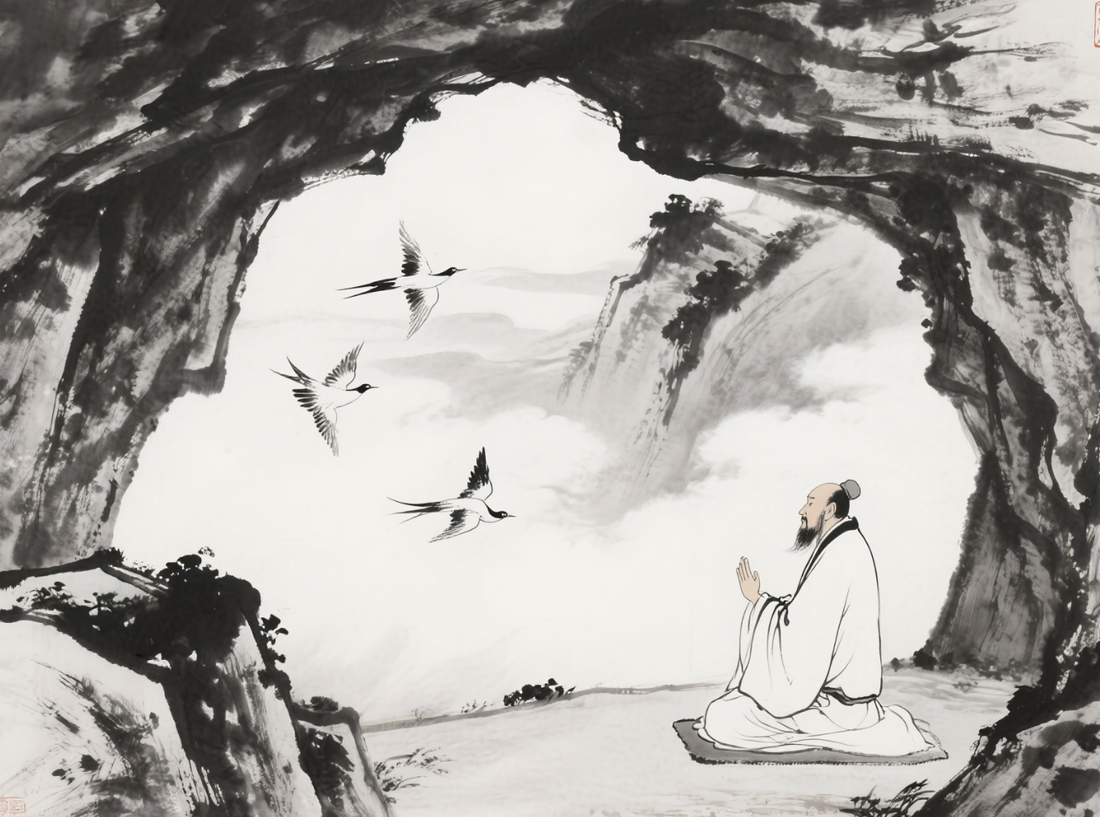Le texte chinois original
希言自然,故飘风不终朝,骤雨不终日。孰为此者?天地。天地尚不能久,而况于人乎?故从事于道者,道者,同于道;德者,同于德;失者,同于失。同于道者,道亦乐得之;同于德者,德亦乐得之;同于失者,失亦乐得之。信不足,焉有不信焉。
S'abstenir de parler caractérise celui qui obéit à la spontanéité de sa nature. Un vent violent ne dure pas toute la matinée ; une pluie soudaine ne dure pas toute la journée. À qui ces deux choses sont-elles dues ? Au Ciel et à la Terre. Si le Ciel et la Terre ne peuvent faire durer de tels actes (spasmodiques), combien moins l'homme le peut-il !
Par conséquent, lorsque quelqu'un fait du Dao son affaire, ceux qui le poursuivent également sont d'accord avec lui en cela, et ceux qui font de la manifestation de son cours leur objectif sont d'accord avec lui en cela ; tandis que même ceux qui échouent dans ces deux choses sont d'accord avec lui là où ils échouent.
Ainsi, ceux avec qui il s'accorde quant au Dao connaissent le bonheur de l'atteindre ; ceux avec qui il s'accorde quant à sa manifestation connaissent le bonheur de l'atteindre ; et ceux avec qui il s'accorde quant à leur échec connaissent également le bonheur de l'atteindre (au Dao). (Mais) lorsqu'il n'y a pas suffisamment de foi (de sa part), un manque de foi (en lui) s'ensuit (de la part des autres).
✨ Recommended Taoist Talismans
Discover powerful talismans for your spiritual journey
【译文】不用声教政令干预黎民是合乎自然的。
因为狂风刮不到第二天的早晨,暴雨下不了一整天。谁制造了狂风暴雨呢? ? ,就会把德作为自己的行为准则;从事于失的人,就会把失作为自己的行为准则。把道作为自己行为准则的人,道也会愉快的拥有他,使他得到道的利惠;把德作为自己行为准则的人,德也会愉快的拥有他, 使他得到德的利惠 ;拥有他,使他得到失的利惠。许诺没有价值,那里就会产生不信任。
【Traduction】Il est conforme à la nature de gouverner le peuple sans utiliser d'instructions vocales ni de décrets politiques.
Car un vent violent ne peut durer jusqu'au lendemain matin, ni une pluie torrentielle toute la journée. Qui envoie le vent violent et la pluie torrentielle ? Le ciel et la terre. Même les tempêtes créées par le ciel et la terre ne peuvent durer indéfiniment ; à plus forte raison les décisions humaines !
Par conséquent, ceux qui s'engagent avec le Tao prennent le Tao comme norme de conduite ; ceux qui s'engagent avec la vertu prennent la vertu comme norme ; ceux qui s'engagent avec la perte prennent la perte comme norme.
Ceux qui prennent le Tao pour norme seront accueillis avec joie par le Tao et en retireront ainsi les bienfaits ; ceux qui prennent la vertu pour norme seront accueillis avec joie par la vertu et en retireront ainsi les bienfaits ; ceux qui prennent la perte pour norme seront accueillis avec joie par la perte et en subiront ainsi les conséquences.
Lorsque les promesses manquent de sincérité, la méfiance s'installe.
【解析】失,是老子思想中的现实世界,是经过人文干预具备了一定文化伦理准则的社会,比如智圣仁义等,这是与永恒存在的自然的道相违背,因此老子称之为失道、失德,不过这种失道失德的现实却是人确实参与其中的,而且能够得到一定的利惠,于是老子有是章之讨论。
【Analyse】 : Dans la philosophie de Lao Tseu, la « perte » (失) désigne le monde réel où l'intervention humaine a introduit des normes culturelles et éthiques telles que la sagesse, la bienveillance et la droiture. Ces normes s'opposent au Tao éternel et naturel. C'est pourquoi Lao Tseu qualifie cet état de « déviation du Tao » (失道) et de « déviation de la vertu » (失德). Néanmoins, cette réalité de déviation du Tao et de la vertu concerne bel et bien l'être humain, et il peut en tirer certains bénéfices. C'est pourquoi Lao Tseu l'aborde dans ce chapitre.


















